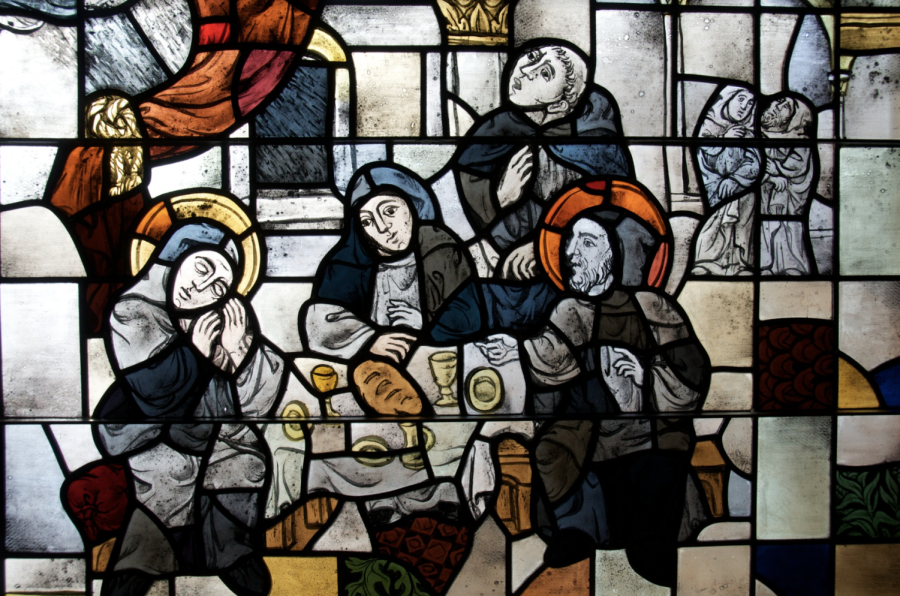Let us remember Saint Scholastica, the patron of breaking intervis
Stained glass at the Abbey depicts Saints Scholastica and Benedict that fateful night
February 9, 2023
According to the student handbook, members of the opposite sex are allowed to be in residence halls and apartments at certain times, and longer times in lounges. Further, overnight guests must be “the same gender as their host”. These rules, of course, are rarely followed or enforced outside the freshman dorms, as everyone who completes Conversatio knows “an unjust law is not a law”, so they are doing nothing wrong by simply breaking these rules. However, the rules are still occasionally enforced, and we who socialize in righteous rebellion seek an inspiring holy hero to protect us.
In my four years at Saint Anselm College, it’s never been clear to me what purpose the gendered visitation rules serve. I’ve heard some speculative theories, most of which suggest they have something to do with the Catholic, Benedictine identity of the college. Although there seems to be a contradiction between restricting guests and Jesus’s radical command to welcome Him in the stranger, it might as well be fitting to the Benedictine values to humbly respect and follow the rules of the school. However, from the earliest days of the Benedictines, visitation rules were meant to be broken. A very important saint, who is celebrated February 10, is most remembered for a miracle involving staying overnight with members of the opposite sex.
More than 1400 years ago lived a nun named Scholastica. Her brother Benedict is well known to all of us, not only as the author of a Conversatio reading, but also the founder of the religious order that founded our school. St. Gregory the Great tells that Scholastica visited with her brother every year in a monastery house. One visit, Benedict came with a few other monks, and they all sang and talked of holy things all day, past their meal and into the night. When it was “quite late”, perhaps around the time intervis ends, Scholastica told Benedict, “Please do not leave me tonight, brother. Let’s keep on talking about the joys of heaven till morning.” But Benedict was an abbot, which in those days was something like an overly strict RA, and he told her “You know I cannot stay away from the monastery.”
Scholastica was not pleased by Benedict’s rule-following refusal to stay the night, and she prayed and cried. Her tearful prayers were immediately answered, and the clear night sky instantly turned to thunder and downpours, keeping Scholastica’s guests from leaving. So, Benedict and Scholastica stayed together all night, and “both of them derived great profit from the holy thoughts they exchanged about the interior life.”
Clearly, there can be something holy about staying up all night and talking with your friends, as God blessed Scholastica with the opportunity to do so, even though Benedict’s rules prohibited it. St. Gregory used that story to explain that even the saintly Benedict did not have all his wishes fulfilled. Benedict’s wish to go back to the monastery was not granted, as Scholastica’s prayer that he stay was granted instead. The reason Scholastica’s wish triumphed over Benedict’s, Gregory says: “hers was the greater love.”
St. Benedict did not intend any of his rules to be “harsh” or “burdensome,” and I would assume the same can be said of the college. Benedict does say in the prologue to his Rule, “The good of all concerned, however, may prompt us to a little strictness in order to amend faults and safeguard love.” The intervisitation rules do seem to intend to amend faults: staying out past 3am is usually unwise. Or they might safeguard love: maybe your roommate misses you if you don’t come back to your own room! But you cannot safeguard love by preventing a greater love. Just as Benedict’s pious strictness was humbled before Scholastica’s pious love, the handbook’s strictness should be flexible around students’ loving violations, such as a welcome to stay in a cooler, quieter first-floor room when a friend is dehydrated or their neighbor keeps blasting OutKast at 3am, a comforting conversation in a private dorm when someone is upset just before midnight, the compassionate sensitivity toward queer friends, and of course, loving God and discussing holy things all night.
So, in the spirit of some of my fellow Crier opinion writers’ traditionalist Catholic conservatism, it might be fair to say these silly rules should be kept as a Chesterton’s fence. But they should only be enforced out of love. There is a time for order and rules out of love and goodness, but there is also a time to bend and break them out of love and goodness. As St. Paul wrote, “your every act should be done with love”. May our love always be as great as that of our patron saint of breaking intervis.
St. Scholastica, pray for us! Amen



